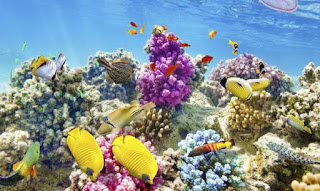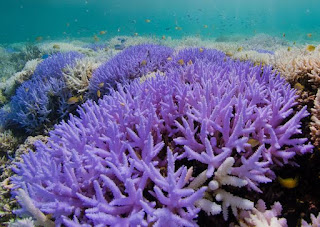The
Coral Reef Ecosystems
Coral reefs are some of the most diverse and most beautiful ecosystems in the world. Coral polyps (Coelenterates, Kingdom: Animalia, Phylum Coelenterata ), the animals primarily responsible for building reefs, can take many forms: large reef-building colonies, graceful flowing fans, and even small, solitary organisms. Thousands of species of corals have been discovered; some live in warm, shallow, tropical seas and others in the cold, dark depths of the ocean.
Because of the diversity of life found in the habitats created by corals, reefs are often called the "rainforests of the sea." About 25% of the ocean's fish depend on healthy coral reefs. Fishes and other organisms shelter, find food, reproduce, and rear their young in the many nooks and crannies formed by corals. The Northwest Hawaiian Island coral reefs provide an example of the diversity of life associated with shallow-water reef ecosystems. This area supports more than 7,000 species of fishes, invertebrates, plants, sea turtles, birds, and marine mammals.
Coral characteristics:
Shallow water, reef-building corals have a symbiotic relationship with photosynthetic algae called zooxanthellae, which live in their tissues. The coral provides a protected environment and the compounds zooxanthellae need for photosynthesis. In return, the algae produce carbohydrates that the coral uses for food, as well as oxygen. The algae also help the coral remove waste. Since both partners benefit from the association, this type of symbiosis is called mutualism.
Deep-sea corals live in much deeper or colder oceanic waters and lack zooxanthellae. Their food habit is a bit different. They takes plankton and organic matter for much of their energy needs.
Benefits of coral reef ecosystems:
Coral reefs protect coastlines from storms and erosion and offer opportunities for recreation. They are also are a source of food and new medicines. Corals are popular as souvenirs, for home decor, and in costume jewelry, yet corals are living animals that eat, grow, and reproduce. It takes corals decades or longer to create reef structures, so leave corals and other marine life on the reef. Corals are already a gift. Don’t give them as presents. Please stop Giving Corals as a present. They are Living animals. They have Life. Try to enjoy their beauty from a distance. They are not stones. They have life. Corals have long been popular as souvenirs, for home decor, and in jewelry, but many consumers are unaware that these beautiful structures are made by living creatures. Fewer still realize that corals are dying off at alarming rates.
Threats to coral reef ecosystems and New Vision of Corals Importance:
Unfortunately, coral reef ecosystems are severely threatened. Some threats are natural, such as diseases, predators, and storms. Other threats are caused by people, including pollution, sedimentation, unsustainable fishing practices, and climate change, which is raising ocean temperatures and causing ocean acidification. Many of these threats can stress corals, leading to coral bleaching and possible death, while others cause physical damage to these delicate ecosystems. During the 2014-2017 coral bleaching event, unusually warm waters (partially associated with a strong El Niño) affected 70% of coral reef ecosystems worldwide. Some areas were hit particularly hard, like the Great Barrier Reef in Australia, where hundreds of miles of coral were bleached. Corals are able to recover from bleaching events if conditions improve before they die, though it can take many years for the ecosystems to fully heal. Scientists are also testing new ways to help coral reef ecosystems, such as growing coral in a nursery and then transplanting it to damaged areas. . They can use these organisms and ecosystems to teach many scientific concepts including symbiotic relationships, reproduction strategies, food webs, chemistry, biotic and abiotic interactions, human impacts, and more. Additionally, educators can use corals to teach about conservation and stewardship of the environment.
Photo Credits: Google
Watch this beautiful video of coral: https://youtu.be/nvq_lvC1MRY (You Tube link)
Authored by: Sahidul Islam







No comments:
Post a Comment